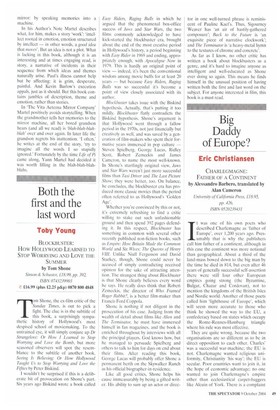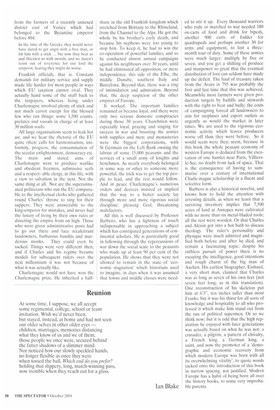Big Daddy of Europe?
Eric Christiansen
CHARLEGMAGNE: FATHER OF A CONTINENT by Alessandro Barbero, translated by Alan Cameron University of California Press, £1 8.95, pp. 426, ISBN 0520239431 1 t was one of his own poets who described Charlemagne as 'father of Europe', over 1,200 years ago. Presumably that is why the publishers call him father of a continent, although in this case the continent was more notional than geographical. About a third of the land-mass bowed down to the big man by the time he died in 814, but even after 46 years of generally successful self-assertion there were still four other European empires going strong (the Byzantine, Bulgar, Chazar and Cordovan), not to mention the kingdoms of the British Isles and Nordic world. Another of those poets called him 'lighthouse of Europe', which will seem more accurate to those who think he showed the way to the EU, a confederacy based on states which occupy the Rome-Rennes-Hamburg triangle where his rule was most effective.
They are quite wrong, because the two organisations are so different as to be in direct opposition to each other. Charles' was a successful war-machine; the EU is not. Charlemagne wanted religious uniformity, Christianity 'his way'; the EU is secular. Poor countries want to join it, in the hope of economic advantage; no one wanted to join Charlemagne's empire other than ecclesiastical carpet-baggers like Alcuin of York. There is a complaint
from the farmers of a recently annexed district east of Venice which had belonged to the Byzantine emperor before 804:
In the time of the Greeks, they would never have dared to get angry with a free man, or hit hint with a stick ... but now they heat us and threaten us with swords, and we daren't resist out of reverence for our lord the emperor, fearing they mien do worse.
Frankish officials, that is. Constant demands for military service and supply made life harder for most people in ways which EU taxation cannot rival. They actually hand some of the stuff back to the taxpayers, whereas living under Charlemagne involved plenty of stick and not much carrot except for the blessed few who ran things: some 1,500 counts, prelates and vassals in charge of at least 30 million souls.
All large organisations seem to leak hot air, and we hear the rhetoric of the EU quite often: calls for harmonisation, uniformity, progress, the consummation of the secular enlightenment, democracy etc. The main and stated aims of Charlemagne were to produce warlike and obedient freemen, submissive serfs and a respectable clergy, in this life, with a view to salvation in the next. Not the same thing at all. Nor are the superannuated politicians who run the EU comparable to the intellectual clerks who gathered round Charles' throne to sing for their suppers. They were answerable to the king-emperor for mistakes, and never had the luxury of living by their own rules or directing the empire from on high. Those who were given administrative posts had to go out there and face recalcitrant landowners, barbarous bandits and murderous monks. They could even be sacked. Things were very different then, and if Charles and his regime became models for subsequent rulers over the next millennium it was not because of what it was actually like.
Charlemagne would not have won the Charlemagne prize. He inherited a half share in the old Frankish kingdom which stretched from Brittany to the Rhineland, from the Channel to the Alps. He got the whole by his brother's early death, and because his nephews were too young to stop him. To keep it, he had to win the co-operation of powerful families, and so he conducted almost annual campaigns against his neighbours over 30 years, until he had eliminated all opposition, or mere independence, this side of the Elbe, the middle Danube, southern Italy and Barcelona. Beyond that, there was a ring of intimidation and admiration. Beyond that, the deep suspicion of the other empires of Europe.
It worked. The important families remained or became loyal, and there were only two serious domestic conspiracies during those 30 years. Churchmen were especially loyal, praying and singing for success in war and boosting the armies with supplies and men; and monasteries were the biggest corporations, with St Germain on the Left Bank owning the labour of some 15,000 peasants and the services of a small army of knights and henchmen. As nearly everybody belonged in some way or other to someone more powerful, the trick was to get the top people to lead, and the rest would follow. And in peace Charlemagne's numerous orders and decrees insisted or implied that the way to a better society lay through more and more rigorous social discipline: pleasing God, threatening malefactors.
All this is well discussed by Professor Barbero, who has a lightness of touch indispensable in approaching a subject which has constipated generations of continental scholars. He is particularly good in following through the repercussions of war down the social scale to the peasants who made up at least 90 per cent of the population. He shows that they were not allowed to remain in the state of 'economic stagnation' which historians used to imagine, in days when it was assumed that towns and middle classes were need ed to stir it up. Every thousand warriors who rode or marched to war needed 180 ox-carts of food and drink for bipeds, another 900 carts of fodder for quadrupeds and perhaps another 30 for arms and equipment, to last a threemonth tour of duty. Some of these armies were much larger; multiply by five or seven, and you get a shifting of produce and manpower so great that the eventual distribution of loot can seldom have made up the deficit. The haul of treasure taken from the Avars in 795 was probably the first and last time that this was achieved. Meanwhile most farmers were given production targets by bailiffs and stewards with the right to beat and bully; the costs of campaigning forced all landowners to aim for surpluses and export outlets as urgently as would the market in later times. We are used to the vigorous economic activity which leaves producers worse off than they were before. So it would seem were they; seem, because in this book the whole peasant economy of western Europe is deduced from the excavation of one hamlet near Paris. Villiersle-Sec, no doubt from lack of space. That is the consequence of having to summarise over a century of international Charle-magne scholarship in a fluent and selective form.
Barber° is also a historical novelist, and knows how to hold the attention with arresting details, as when we learn that a surviving inventory implies that 7,500 acres of land at Annapes were cultivated with no more than six metal-bladed tools; all the rest were wooden. Or that Charles and Alcuin got into a hot bath to discuss theology. The ruler's personality and physique were much admired and magnified both before and after he died, and remain a fascinating topic; despite his ruthless pursuit of power there is no escaping the intelligence, good intentions and rough charm of the big man of Aachen. His earliest biographer, Einhard, a very short man, claimed that Charles was as long as seven of his own feet (not seven feet long, as in this translation). One reconstruction of his skeleton put him at 6'3", ten inches taller than most Franks, but it was his thirst for all sorts of knowledge and hospitality to all who professed it which make him stand out from the run of political supermen. Or so we think now; but it is odd that the high reputation he enjoyed with later generations was actually based on what he was not: a crusader, a pilgrim, a pattern of chivalry, a French king, a German king, a saint, and now the promoter of a 'demographic and economic recovery from which modern Europe was born with all its overwhelming vitality', to quote words tacked onto the introduction of this book in narrow spacing, not justified. Modern Europe has a habit of being born all over the history books, to some very improbable parents.



















































































































 Previous page
Previous page